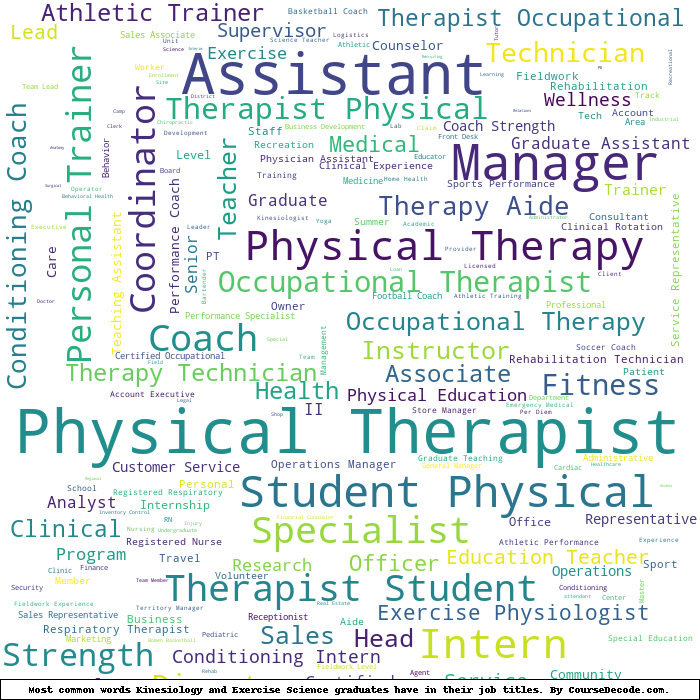
First, some facts. Of the Kinesiology and Exercise Science graduates from University of Mississippi we've analyzed , here's how many have used (or NOT used) their degree in their career:

These are estimates based on AI analysis of 16 LinkedIn profiles (see below).
The verdict? Bad. Overall, with an average relevance score of 45%, Kinesiology and Exercise Science graduates from University of Mississippi have a substantially lower likelihood (-22%) of finding work in this field compared to the average graduate across all fields:
And for comparison, here's the chart for all profiles we've looked at across all degrees.
Also, after graduating, 43% of these graduates have pursued further education other than another Bachelor's degree (such as a Masters degree or other), compared to the average across all profiles of 35%. This suggests you may need more than just a Bachelors degree to be competitive as a Kinesiology and Exercise Science graduate.
See the details:
|
Relevance score: 66% We think this person has gone into a career only somewhat relevant to their degree. We think this person has gone into a career only somewhat relevant to their degree.
DEGREE INFOGraduated in 2017 from University of Mississippi with a Bachelor of Applied Science in Kinesiology and Exercise Science. Also pursued further education since (see below). JOB HISTORY SINCE GRADUATIONNew Grad Registered Nurse North Mississippi Medical Center May 2019 - Present Intensive Care Nurse  University of Alabama at Birmingham Jan 2022 - Present FURTHER DEGREES DONE SINCE GRADUATINGAssociate's degreeMississippi University for Women 2017 - 2019 ABOUTNo information provided. |
The top 10 most common jobs done by the graduates we've analyzed (ranked most common to least) are:
After looking through the job profiles of graduates from the University of Mississippi with degrees in Kinesiology and Exercise Science, it seems like there are some common trends in the types of jobs they landed. Many of them started off in physical therapy or rehabilitation-related positions, such as Physical Therapists or Occupational Therapists, which clearly align with their academic training. These roles directly apply principles of kinesiology and exercise science, allowing graduates to leverage their knowledge to help patients recover and improve their mobility. However, it’s also notable that there are a significant number of graduates who have veered off into completely unrelated fields, such as finance, administration, and customer service jobs. This indicates that while some have found their way to relevant careers, others have not directly utilized their degree in their job choices.
In general, you can see a mix of relevance to their studies. While specific roles in physical therapy and occupational therapy are spot-on, a lot of graduates have pursued paths where their Kinesiology and Exercise Science degree isn’t really applicable, such as in banking, sales, and various administrative roles. It’s a bit of a mixed bag! If you’re thinking about pursuing a degree in this area, it might be worth considering how you want to apply that knowledge in the professional world, as not every path taken will relate back to kinesiology directly.
Here is a visual representation of the most common words in job titles for Kinesiology and Exercise Science graduates (this is across all Kinesiology and Exercise Science graduates we've analyzed, not just those who went to University of Mississippi):

Graduates from the University of Mississippi with degrees in Kinesiology and Exercise Science tend to start their careers in various fields that may or may not directly tie back to their degree. Right after graduation, many seem to find themselves in positions related to healthcare, such as physical therapists, occupational therapists, or roles in health-related organizations. This shows they’re utilizing their educational background to step into roles where they can contribute to physical health and rehabilitation, which is a big plus since it aligns closely with their studies. However, there are also graduates who seem to drift towards completely unrelated fields, like banking or administrative roles, which may not make the most use of their specialized training.
Looking down the line, around five to ten years after graduation, the picture becomes a bit mixed. Some graduates remain in health-related career paths, taking on advanced roles in physical therapy or healthcare management, which reflects a healthy progression in their careers. Others have shifted to different sectors entirely, such as finance or management positions in unrelated companies. This indicates that while a number of these graduates are building fulfilling careers aligned with Kinesiology and Exercise Science, there are those who’ve found themselves in jobs that don't leverage their degree’s potential. Thus, it seems like the outcomes really depend on individual choices and opportunities rather than a linear path following their degree. Overall, it's a mix of success in the intended field and a fair share of diversions into other industries.
Getting a Bachelor’s degree in Kinesiology and Exercise Science at the University of Mississippi is generally on the easier side compared to some other science-heavy degrees, but don’t let that fool you into thinking it’s a walk in the park. You’ll still need to hit the books for your anatomy, physiology, and exercise physiology classes, plus you'll likely have some lab work, which can be intense but super interactive. It's a good mix of practical stuff and theory, and if you’re into sports or health, it can actually be pretty fun and motivating. So, while it might not be the hardest degree, it still requires dedication and effort, especially if you want to really understand the material. Overall, if you’re passionate about fitness and health, you'll probably find the coursework enjoyable rather than burdensome!
Most commonly, in the LinkedIn profiles we've looked at, it takes people 4 years to finish a Bachelor degree in Kinesiology and Exercise Science.
So, looking at the job paths of these Kinesiology and Exercise Science graduates from the University of Mississippi, it's a mixed bag in terms of earnings. Some grads, like those who pursued careers in physical therapy, nursing, or higher-level roles in finance, like the Director position at UBS, likely pulled in some decent salaries, especially after a few years in the field. On the other hand, those who started in roles like executive assistants or customer service positions might not be making as much initially, since those jobs often pay less. Overall, it seems like while some are doing quite well, others are still working their way up the ladder, so the money situation varies quite a bit.
Here is a visual representation of the most common words seen in the "about" section of LinkedIn profiles who have a Bachelor degree in Kinesiology and Exercise Science (this is across all Kinesiology and Exercise Science graduates we've analyzed, not just those who went to University of Mississippi). This may or may not be useful:

Here are all colleges offering a Bachelor degree in Kinesiology and Exercise Science (ordered by the average relevance score of their Kinesiology and Exercise Science graduates, best to worst) where we have analyzed at least 10 of their graduates: